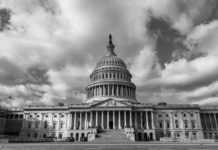
The House of Representatives voted to reject the Biden administration’s rule that outlawed common pistol braces. The action by the Republican-led House against the Bureau of Alcohol, Tobacco and Firearms (ATF) regulation is not likely to become law but sends a significant message to the White House.
The bill introduced by Rep. Andrew Clyde (R-GA) would block the ATF’s rule banning such pistol stabilization practices by a 219-210 vote.
Two Republicans voted against the measure while two Democrats voted in favor.
The perceived lack of action by the House Republican leadership helped spark dissension from some of the more conservative members of the House.
The White House announced this week that President Joe Biden would veto any such measure if it got through both houses of Congress.
A statement described firearms that use the brace as “more concealable than long guns, yet more dangerous and accurate at a distance than traditional pistols.”
US House passes ATF pistol brace repeal resolution with 219-210 vote, sending it to the Senate: pic.twitter.com/yL9ueO3rtq
— Firearms Policy Coalition (@gunpolicy) June 13, 2023
During a floor debate on the reversal of the rule, Rep. Jerry Nadler (D-NY) was unclear about the nature of such braces.
Rep. Thomas Massie (R-KY) cited a 2012 ATF letter in which it stated that such stabilizer braces “would not alter the classification of a pistol or other firearm” and “would not be subject to National Firearms Act controls.”
Nadler was unable to identify the function of such a stabilizer brace.
Massie asked about the appropriate prison sentence for “owning a piece of plastic.”
Nadler said, “I’m not a judge, I’m not going to say what a fair prison term would be.”
The proposed firearms regulation was challenged by the attorneys general of 27 states.
The officials wrote in a letter to House Speaker Kevin McCarthy (R-CA) last month that the rule is “an egregious overreach.”
It added that the ATF had recognized “that pistols equipped with stabilizing braces are not short-barreled rifles subject to the registration and tax requirements of the Gun Control Act of 1967 and the National Firearms Act” for more than a decade.
The attorneys general describe the move as reversing course “without statutory authority.”
The officials called on McCarthy to hold a vote to block the implementation of the rule.










